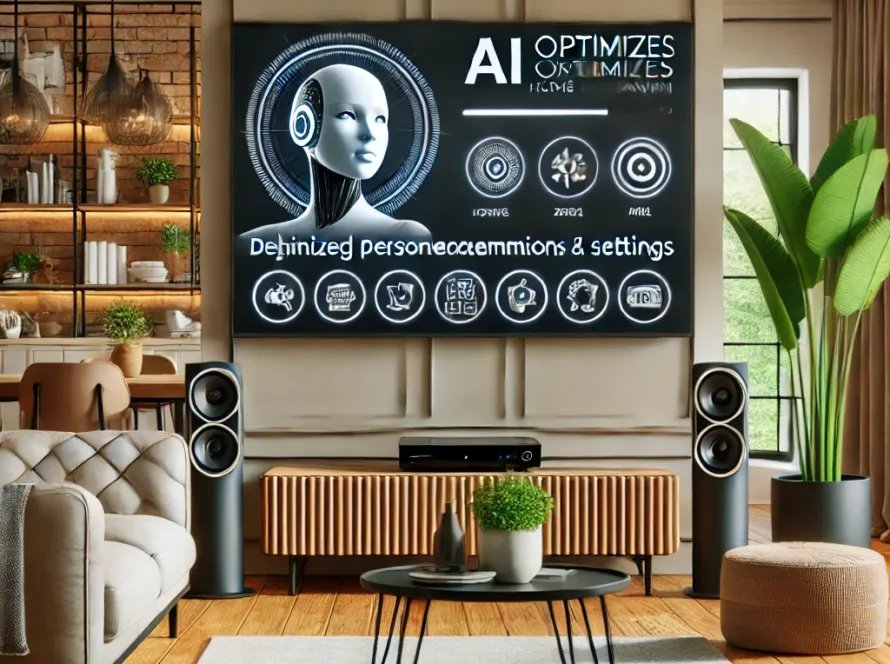Artificial intelligence (AI) is transforming home entertainment systems, making them smarter, more personalized, and increasingly integrated into our daily lives. From streaming services that anticipate your preferences to voice-activated controls that simplify navigation, AI is enhancing the way we experience entertainment at home. Here’s how AI is revolutionizing home entertainment systems.
1. Personalized Content Recommendations
One of the most noticeable impacts of AI in home entertainment is the ability to provide personalized content recommendations. Streaming platforms like Netflix, Amazon Prime, and Disney+ use AI algorithms to analyze your viewing history, preferences, and behavior to suggest movies, TV shows, and even music that you’re likely to enjoy. This personalization not only improves your viewing experience but also helps you discover new content that matches your interests.
2. Voice-Activated Controls
AI-powered voice assistants like Amazon Alexa, Google Assistant, and Apple Siri have become integral parts of modern home entertainment systems. With simple voice commands, you can search for movies, control playback, adjust the volume, or even switch between different apps and devices. This hands-free control makes interacting with your entertainment system more convenient and intuitive, allowing you to focus on enjoying your content.
3. Smart Home Integration
AI is at the heart of smart home integration, allowing your entertainment system to interact seamlessly with other smart devices in your home. For example, you can set up a routine where saying “Movie time” to your voice assistant automatically dims the lights, closes the blinds, and turns on your TV and sound system. This level of automation enhances the immersive experience of home entertainment and makes managing multiple devices effortless.
4. Advanced Audio and Visual Enhancements
AI is also driving significant advancements in audio and visual technology. AI-powered upscaling algorithms can enhance the quality of video content, making older or lower-resolution footage appear sharper and more vibrant on modern displays. Additionally, AI-driven sound systems can analyze room acoustics and automatically adjust settings to deliver optimal audio performance, providing a more immersive and cinematic experience.
5. Real-Time Language Translation and Subtitles
For global audiences, AI is revolutionizing the way we consume content in different languages. AI-powered translation tools can provide real-time language translation and generate accurate subtitles for movies and shows. This technology enables viewers to enjoy content from around the world without language barriers, expanding access to a broader range of entertainment options.
6. AI-Powered Gaming
In the gaming industry, AI is enhancing everything from graphics rendering to in-game decision-making. AI algorithms can create more realistic and responsive non-player characters (NPCs), making games more challenging and engaging. Additionally, AI-driven game engines can adapt gameplay based on the player’s skill level, providing a personalized and dynamic gaming experience that evolves as you play.
7. Predictive Maintenance for Devices
AI can also be used to monitor the health of your home entertainment devices and predict when maintenance or updates are needed. By analyzing usage patterns and system performance, AI can alert you to potential issues before they become problems, helping you maintain your equipment and ensuring a smooth entertainment experience.
8. Enhanced Content Search and Discovery
AI is improving the way we search for and discover content. Voice search capabilities powered by AI allow you to find specific movies, shows, or songs by simply describing them, even if you don’t know the title. AI algorithms can also analyze your preferences and suggest new genres or artists you might enjoy, making content discovery more intuitive and personalized.
9. Interactive and Immersive Experiences
AI is enabling more interactive and immersive entertainment experiences. For example, AI-powered virtual reality (VR) and augmented reality (AR) systems can create personalized environments that respond to your movements and actions. These technologies are opening up new possibilities for gaming, virtual concerts, and interactive storytelling, providing a more engaging and participatory form of entertainment.
10. Future of AI in Home Entertainment
As AI technology continues to advance, the possibilities for home entertainment are virtually limitless. We can expect even more sophisticated content recommendations, seamless integration with smart home ecosystems, and enhanced interactive experiences. AI will likely play a central role in shaping the future of how we consume, interact with, and enjoy entertainment at home.
AI is revolutionizing home entertainment systems by making them smarter, more personalized, and more integrated into our daily lives. From enhancing audio-visual experiences to providing intuitive voice controls and personalized content, AI is transforming the way we enjoy entertainment at home. As technology continues to evolve, the impact of AI on home entertainment will only grow, offering even more innovative and immersive experiences for users.


